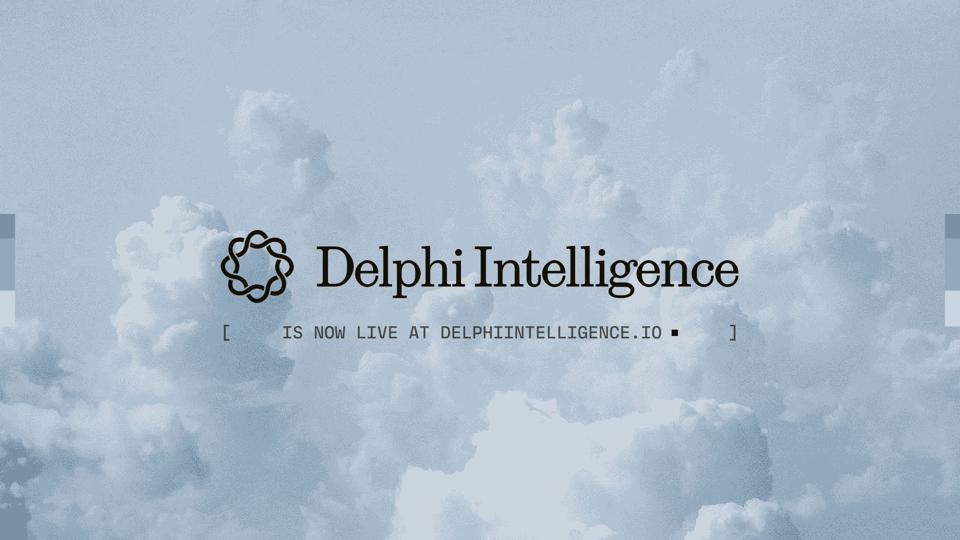When I was researching my book AI First, Human Always, I spent months combing through hundreds of sources on artificial intelligence—academic papers, startup blogs, VC reports, and more. What I discovered was a fragmented and often frustrating landscape: most of the best thinking was either deeply technical or locked behind jargon, while the rest was watered down for engagement rather than insight.
It was clear that while AI was advancing quickly, access to meaningful, actionable research for business leaders hadn’t kept pace.
That’s what makes the launch of Delphi Intelligence notable. A new initiative from crypto-native firm Delphi Digital, the platform aims to become a go-to research hub for AI and emerging technologies—offering curated, open-access content that’s rigorous yet accessible to decision-makers who don’t hold PhDs in machine learning. It’s the first free AI research hub launched by a crypto-native company whose venture fund has invested more than $25 million in early-stage AI investments, spanning venture capital and accelerator support.
The platform is built for professionals navigating the fast-evolving AI space—executives, product leads, policymakers, and investors—who need clarity on where the technology is going and what matters most to their strategies. Delphi’s goal is to fill the gap between click-driven summaries and inaccessible academic work.
From Crypto Research Pioneer to AI Strategy Platform
Founded in 2018, Delphi Digital built its reputation by offering institutional-grade crypto research at a time when such insights were difficult to find. Its early reports on Ethereum economics, DeFi primitives, and Layer 1 ecosystems made it a staple among hedge funds, protocols, and serious retail investors.
Over the last five years, the Delphi brand has expanded into investing and acceleration. Delphi Ventures now backs early-stage companies across Web3 and AI, while Delphi Labs runs accelerator programs and technical experiments. But AI didn’t emerge as a focus overnight—it’s been growing behind the scenes.
“To be the best possible investors and builders going forward, firms will have no choice but to build expertise in other parallel areas—especially AI,” said Anil Lulla, co-founder and CEO of Delphi Digital.
Over the past two years, Delphi Labs has vetted more than 400 AI startups through its accelerator, backed dozens, and produced the “DeAI” research series exploring the convergence of crypto and artificial intelligence. Delphi Ventures alone has deployed over $25 million into early AI companies. With Delphi Intelligence, those fragmented research efforts are consolidated under a single platform with a public mission.
Why Delphi AI Intelligence Is Different
Unlike AI newsletters optimized for speed or research journals written for machine learning PhDs, Delphi Intelligence is designed for decision-makers: executives, investors, product leads, and policy professionals who want to understand where the AI landscape is moving—and why it matters to their business.
The platform’s early content includes an analysis of AI-powered web browsers, an investigation into generative video models, and a multi-part series on reinforcement learning and the evolving value chain between model providers and application layers.
Critically, all research will be free to access. Users can also subscribe to receive updates via email. Delphi says its open-access model draws inspiration from the early days of crypto, when public research accelerated industry development and community understanding.
The Business Case for Accessible AI Research
Executives across industries are increasingly aware of AI’s transformative potential—but not all feel equipped to make informed decisions. According to Gartner’s 2024 survey of enterprise leaders, 62 percent of executives believe AI will materially affect their industry within the next two years. Yet only 28 percent feel they understand the technology well enough to guide strategic planning.
Delphi Intelligence is tailored to this knowledge gap. Rather than teaching readers how to fine-tune a model, the platform focuses on foundational shifts in technology, infrastructure, and business models. Its goal is to help leaders see where value is being created—and where competitive threats may emerge.
The company also sees benefits beyond thought leadership. By openly publishing its research, Delphi gains real-time feedback from readers navigating AI transformations across geographies and multiple industries. This loop helps inform Delphi Ventures’ investing, Delphi Labs’ technical work, and future research priorities.
A Crowded Market, But a Clear Niche For AI Research
While AI coverage is exploding across Substacks, corporate blogs, and research firms, Delphi Intelligence may be the first initiative of its kind from a crypto-native firm with this level of cross-functional reach.
McKinsey, Bain, and Gartner all publish paid reports on AI and automation, while VC firms such as Andreessen Horowitz periodically release thought pieces. Startups like Not Boring and Every bring narrative storytelling to tech trends, and daily newsletters like Ben’s Bites or The Rundown AI summarize headlines.
But none offer a dedicated, open-access platform combining research, incubation, and investment under one brand—especially not one shaped by crypto-native experience navigating other frontier technologies.
This positioning may give Delphi an edge in a field that increasingly demands multidimensional expertise. AI is no longer just a standalone category—it is converging with cryptography, robotics, privacy infrastructure, and smart contracts.
The Stakes: A Multitrillion-Dollar AI Inflection Point
The scale of AI’s impact is hard to ignore. According to McKinsey, generative AI alone could add between $2.6 trillion and $4.4 trillion annually to global GDP. Meanwhile, Bain & Company reports that 60 percent of institutional investors expect to allocate capital to AI-linked infrastructure by 2026.
In this context, understanding how and where value accrues—from models and chips to APIs and middleware—is becoming an executive imperative.
Delphi Intelligence seeks to serve that need. Not by adding more noise to an already saturated space, but by offering a new layer of clarity: one rooted in technical curiosity, open discourse, and operational experience.
For now, Delphi is betting that the same rigor and independence that made it a trusted voice in crypto can do the same in AI.
Did you enjoy this story about the first free AI Hub of research? Don’t miss my next one: Use the blue follow button at the top of the article near my byline to follow more of my work.

